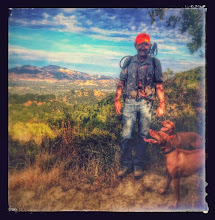This last weekend we held a Northern California Vizsla trial in the Mojave Desert around California City, California. We were forced to move the event 200 miles south of our intended site because of the weeks of rain we had had in Northern and Central California.
One of the interesting and dangerous occurrences that happened was coming across two Mojave Green rattlesnakes and one Diamondback rattlesnake on courses we were running the dogs on.
Thankfully no dog or person was bit. One dog did hold point of a coiled Mojave Green during his brace.
One of the interesting and dangerous occurrences that happened was coming across two Mojave Green rattlesnakes and one Diamondback rattlesnake on courses we were running the dogs on.
Thankfully no dog or person was bit. One dog did hold point of a coiled Mojave Green during his brace.
Things got a somewhat interesting for a while "on course."
About the Mojave Green:
"Some Mojave rattlesnakes are greenish, but can be colored greenish gray, olive-green, or occasionally brownish or yellowish.
This rattlesnake has a very potent venom which is considered ten times more toxic than other North American rattlesnakes, a fact that makes the Mojave rattlesnake one of the most dangerous poisonous snakes in the United States. Their venom works as a neurotoxin and is called Mojave toxin. Strangely, the bite of a Mojave Rattlesnake is usually not as painful as other rattlesnake bites."
In the late fall and winter, rattlesnakes go underground to stay warm. By late March, as the weather warms, they come out.
I would recommend not letting your dog run loose in this part of the world during the spring and summer. The Mojave Green's venom is so potent that a dog's chance of survival, if bit, is zero.
Most dogs are naturally curious about snakes.
Here, in the West, many classes are taught for dogs in snake avoidance. Example of a course in Tucson, Arizona is:
http://snake-avoidance.com/
I will be signing Bailey and Chloe up for classes like these as we do have rattlesnakes in our part of the world. They are just not as dangerous as the Mojave Green.












1 comment:
The beauty of these snakes always makes me attracted to them. And I just love the shows of Steve Irwin on discovery and I loves the way he handle these creatures and provide some nice information regarding handling them without hurting the snake itself.And it is a matter of grief that a nice dedicated zoologist died such a sudden death and we can't see him again.
Post a Comment